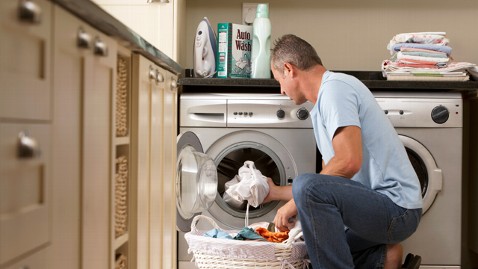Doing Chores Makes Many Men Happiest

(Image Credit: Getty Images)
Many men are happiest when making an equal contribution to household chores, according to a University of Cambridge study that concludes what many women might have considered unimaginable.
"Contrary to expectations, they found that men, not women, benefited from a less traditional gender role divide in household chores," the introduction to the study reads.
And women weren't the only ones left scratching their heads. The researchers themselves were surprised with the findings.
"The academics expected to find that men's work-family conflict rose, and their well-being fell, when they did more housework," a University of Cambridge news release states. "In practice, they found the opposite, with conflict falling, and well-being going up."
The professor who conducted the study was traveling and unavailable to comment.
The study was conducted across seven European countries and tens of thousands of participants were asked how much time they spent on tasks such as cooking, washing, cleaning, shopping and property maintenance. They then weighed work-life conflict with other measures of their well-being, which provided the surprising results.
Researchers attributed their findings to two factors: They believe more men support gender equality and women are more assertive than in the past.
The researchers said men are actually uncomfortable when they are not taking equal responsibility for housework. And history and habit might also contribute to such guilt.
"[The results] suggest that men may be uncomfortably conscious of work getting in the way of their doing a fair share of chores at home, whereas women have long been used to doing a 'double shift,'" the introduction says.
Women's attitudes are also evolving, allowing them to voice their concerns. "Women are becoming more assertive and making their dissatisfaction with lazy partners plain," the news release states.
The research, titled "Gendered Lives ," which includes the findings on men and household chores, analyzes several other aspects of gender equality as well, including equality at home and in the workplace.
While this aspect of the gender gap seems to be closing, the researchers saw mixed results in other areas.
"Prospects for the future remain mixed. On the one hand, an investigation into the business case for closing the workplace gender gap was 'not encouraging,'" the news release states. "At the same time, however, there are grounds for optimism. Regardless of policy regimes, researchers found evidence that across Europe, the gap between women and men in terms of how much paid and unpaid work both do, is closing."
Overall, the researchers believe gender equality is moving, however slowly, in the right direction.
"The conclusion is that as far as gender roles are concerned," the book's editors find, "there is staggered adaptation, rather than a stalled revolution."